Cooking is an essential part of our daily routine, And with It comes the inevitable task of cleaning up. Grease pots And pans can be particularly challenging to clean, especially when left unattended for too long. Built-up grease not only affects the appearance of your cookware but can also impact Its performance over time. Learning how to clean grease pots And pans effectively is A valuable skill that every home cook should have. In this article, We will explore various techniques on how to clean grease pots And pans, including natural remedies and commercial products. We Will provide step-by-step instructions on how to remove stubborn stains without damaging your cookware’s surface.
Does Vinegar Remove Grease From The Pan?
Yes, Vinegar can effectively remove grease from A pan. The acetic acid in vinegar acts as A natural degreaser And helps break down And dissolve the greasy residue. To use vinegar for grease removal, mix equal parts of vinegar and water and apply the solution to the greasy pan. Let it sit for A few minutes, then scrub the surface with A sponge or brush. The acidic properties of vinegar will help cut through the grease and make it easier to clean. However, for heavily greased pans, you may need to repeat the process or use A stronger degreasing agent.
How Do You Get Grease Off Stainless Steel Pots?
To clean grease off stainless steel pots, You can follow these steps. Firstly, Rinse the pot with warm water to remove any loose debris. Then, Create A cleaning solution by mixing equal parts of dish soap and water. Apply the solution to the greasy areas and let it sit for A few minutes. Next, scrub the pot with A non-abrasive sponge or brush, focusing on the greasy spots. For stubborn grease, You can also use baking soda or vinegar as additional cleaning agents. Rinse the pot thoroughly with warm water And dry it with A clean towel.
How To Clean Cast Iron Skillet Rust?
To clean rust off A cast iron skillet, follow these steps. First, Scrub the rusted areas with A stiff brush or steel wool to remove loose rust flakes. Next, create A paste by mixing equal parts of baking soda and water. Apply the paste to the rusted spots and let It sit for A few minutes. Then, scrub the area again using A- brush or steel wool. Rinse the skillet thoroughly and dry it completely. Finally, Season the skillet by applying a thin layer of vegetable oil And heating it on low heat for about an hour. Repeat these steps as necessary until the rust is removed.
Importance Of Cleaning Grease Pots And Pans
Cleaning grease pots and pans is of utmost importance for several reasons. Firstly, regular cleaning ensures the longevity of your cookware. Grease buildup can corrode the surface of pots and pans, leading to rust and damage. Secondly, cleanliness promotes healthy cooking. Grease residue can harbor bacteria and contaminants that can contaminate your food and compromise your health. Moreover, cleaning grease pots and pans helps maintain their optimal performance. Grease buildup can affect heat distribution and cooking efficiency. Lastly, a clean kitchen is a pleasant and inviting space. Removing grease not only enhances the appearance of your cookware but also contributes to a hygienic cooking environment. So, make it a habit to clean your grease pots and pans after each use for the sake of your cookware, health, and overall cooking experience.
Clean With Soap And Hot Water
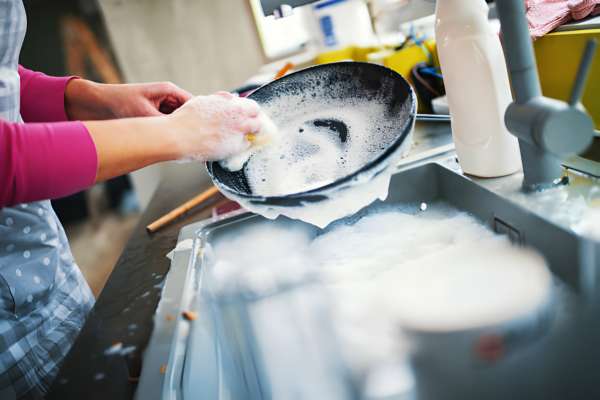
Cleaning grease pots and pans is a breeze with the simple combination of soap and hot water. After cooking, Allow the cookware to cool slightly, Then use hot water And A few drops of dish soap to create a soapy solution. Use A sponge or brush to scrub away the grease, Pay attention to any stubborn spots. Rinse thoroughly with hot water to remove all soap residue. This method effectively cuts through grease, leaving your pots and pans clean and ready for their next use. It’s A quick and effective solution that can be easily incorporated into your cleaning routine.
Baking Soda And Vinegar
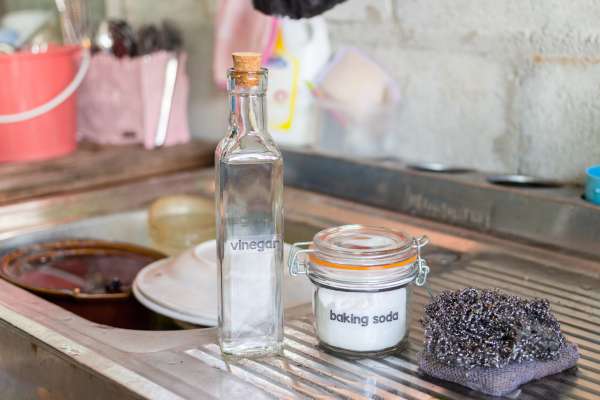
Comes to tackling grease on jars and pans, The dynamic duo of baking soda And vinegar works wonders. Begin by sprinkling A generous amount of baking soda on the greasy surfaces. Then, pour vinegar over the baking soda, Causing A fizzing reaction. Allow the mixture to sit for A few minutes, allowing the chemical reaction to loosen the grease. Grab A scrub brush or sponge and gently scrub away the grease. Rinse thoroughly with water, and marvel at your sparkling clean pots and pans and tray to clean the outside of pots and pans. This natural and cost-effective method will leave your cookware grease-free and ready for your next culinary masterpiece.
Using Oven Cleaner To Clean Burnt Grease
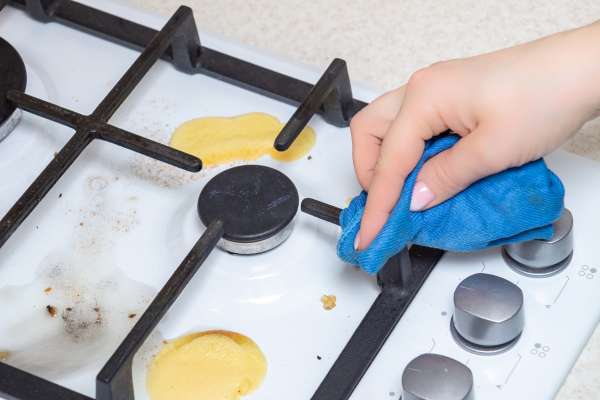
This powerful product is not just limited to cleaning ovens; it can also effectively tackle grease buildup on pots and pans. Simply apply A generous amount of oven cleaner to the affected areas, Allowing It to sit for A few minutes to break down the grease. Then, Scrub the surface with a non-abrasive sponge or brush, And rinse thoroughly. The oven cleaner will work its magic, leaving your pots And pans sparkling clean and grease-free. Say goodbye to the hassle of scrubbing and hello to a quick and efficient solution!
Soak And Scrub
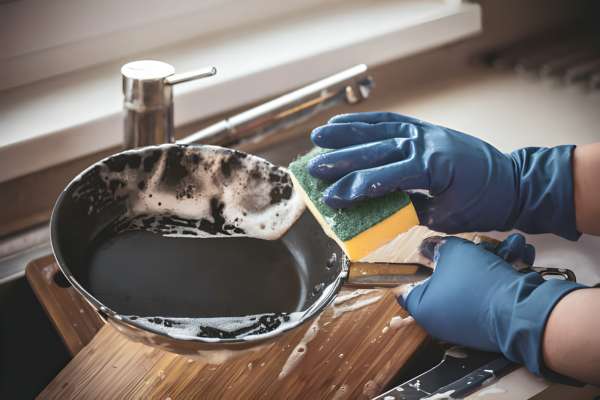
One tried-and-true technique is the soak-And-scrub method. Start by filling your sink or basin with warm water and adding A few drops of dish soap. Submerge the greasy cookware and let It soak for about 30 minutes to loosen the stubborn grease. After soaking, Use A sponge or scrub brush to gently scrub away the grease, paying extra attention to the problem areas. Rinse thoroughly with hot water, And voila! Your jars and pans will be free from grease And ready for your next culinary adventure. This straightforward method is A go-to solution for effortlessly restoring your cookware’s cleanliness.
Clean Greasy Pots And Pans In A Dishwasher
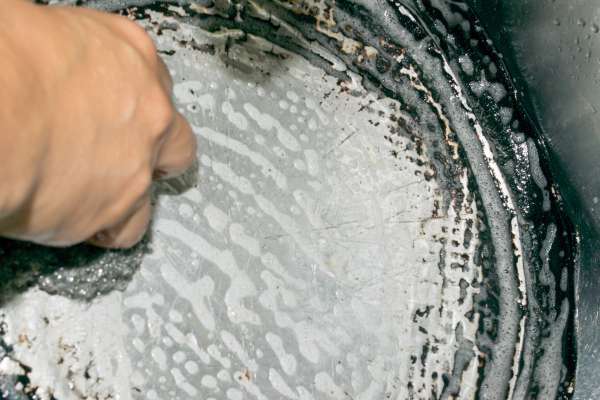
If you’re looking for A hassle-free way to clean greasy pots And pans, Look no further than your trusty dishwasher. Contrary to popular belief, Many cookware items can be safely washed in the dishwasher, Making cleanup A breeze. Before loading, scrape off any excess food debris and give the greasy cookware a quick rinse. Place the pots and pans securely in the dishwasher, Making sure they are not blocking the spray arms. Add a dishwasher detergent tab or liquid, choose an appropriate cycle, and let the machine do its magic. The hot water and powerful jets will effectively remove the grease, Leaving your pots and pans sparkling clean without any elbow grease. Sit back, Relax, And let your dishwasher take care of the dirty work.
How To Use Commercial Degreasers Safely And Effectively
Using commercial degreasers safely and effectively requires following a few key steps. Firstly, carefully read and understand the instructions provided by the manufacturer. Always wear protective gloves, goggles, and clothing to avoid contact with the skin and eyes. Ensure proper ventilation by opening windows or using exhaust fans when working in enclosed spaces. Dilute the degreaser as directed and test it on a small, inconspicuous area to check for any adverse reactions. Apply the degreaser to the greasy surface, allowing it to penetrate and break down the grease. Use a scrub brush or sponge to agitate the area gently. Finally, rinse thoroughly with water to remove the degreaser residue. Remember, following the instructions and taking necessary precautions will help you achieve safe and effective results when using commercial degreasers.
The Final Thought
Cleaning grease jars and pans can be A daunting task, But It’s essential to ensure that your cookware stays in good condition. With the right tools And techniques, you can easily remove all traces of grease from your jars and pans. Remember to use hot water, Dish soap, And A scrub brush to make the cleaning process easier. Additionally, Avoid using abrasive pads or steel wool as they can scratch your cookware. Lastly, always dry your pots and pans thoroughly before storing them away to prevent rusting. Try these tips today, and enjoy spotlessly clean cookware after every meal!
